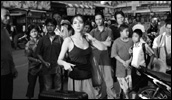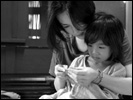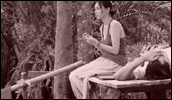Nanayo
- Year
- 2008
- Original title
- Nanayomachi
- Japanese title
- 七夜待
- Director
- Cast
- Running time
- 94 minutes
- Published
- 10 November 2009



by Tom Mes
Widely snubbed by the European festivals that previously formed the director's home turf, Naomi Kawase's Nanayo plays less like a festival favourite than an idol video for its star Kyoko Hasegawa (recently seen in Max Mannix's Rain Fall). A more appropriate title for it would have been 'A Tight Tank Top in Thailand'.
Hasegawa plays Saiko, a Japanese tourist who arrives alone and disoriented in the hectic bustle of a Thai city. Dozing off in the back seat of her taxi, she wakes to find herself seemingly in the middle of the jungle with the driver making attempts to molest her. She runs away in fright, dashing through the dense foliage straight into the arms of handsome flower child Grégoire Colin, who is following a live-in course in Thai massage. After she has calmed down and been convinced that the driver, who turns out to be the brother of the mistress of the house, meant her no harm, Saiko decides to stay and learn the finer points of the art of giving massages - not to mention her thinly veiled desire of getting into handsome Grégoire's pants (alas, he turns out to be gay).
Nanayo finally made its international premiere at the Bangkok International Film Festival, where its blatant attempts at exoticism can't have made much of a positive impression on the locals. There are those (this reviewer included) who believe that films like Shara and The Mourning Forest pander to a foreign thirst for artistically wrapped exotic images of the 'real Japan'. These two titles in particular can be singled out, as they mark an increased influence from foreign investors on Kawase's cinema. Where her debut feature Suzaku gave us Naomi Kawase, the child of Nara, Shara and The Mourning Forest have seen her adopting a position closer to that of a representative of Nara - accentuating the quaint and the colourful, the wistful and the wondrous. As if somebody had been looking over her shoulder, whispering her polite but pressing suggestions as to what will sit well with foreign audiences (more precisely: festival programmers and juries).
Nanayo certainly seems to confirm Kawase's knack for exoticism. This is emphasised all the more by the alien environment, in which she, as is regrettably typical for Japanese filmmakers, seems completely lost. Her much-vaunted documentary eye captures little more than scenery, amid which her cast flounders helplessly as they try to improvise meaningful scenes - the nadir being an overwrought four-way argument over a missing boy that ends with everyone slapping each other upside the head and wrestling on the ground.
Though the director has apparently stated that she made the film out of admiration for the Thai art of massage, the viewer ends up learning more about bad acting than about giving massages. Nanayo is a Babylonian confusion of Japanese, French, Thai, and English. Guest star Colin's stubborn insistence on speaking French in the middle of the Thai jungle as if Dien Bien Phu had never happened, can only be explained as an attempt to appeal to Kawase's French admirers - who proved a lot less gullible than expected.
Nanayo finally popped up in Europe at the 2009 Cannes film market, where it was given a single screening in the hope of attracting foreign buyers. Interestingly, at the same time elsewhere at that festival, Kawase was honoured with a lifetime achievement award bestowed upon her by the Director's Fortnight and given the opportunity to screen her other "forgotten" film, 2001's Hotaru (no mention of Nanayo was made during the ceremony). That film also never managed to find foreign distribution, but this is where the similarities between the two titles end. Hotaru is perhaps Kawase's most interesting film, featuring an immensely powerful central performance from actress Yuko Nakamura (of Strawberry Shortcakes and Shinya Tsukamoto's Tetsuo: The Bullet Man) that retains its impact even in the slimmed-down version of the film prepared for the occasion (Kawase cut almost an hour from the original 164-minute running time in hopes of making Hotaru a smoother sell, though not without damaging some of her original intentions). Featuring plenty of anonymous contemporary cityscapes, Hotaru's mistake in the eyes of foreign distributors was that it wasn't exotic enough. Nanayo is way out on the other end of the spectrum, becoming so exotic that it's painful to watch.
Nanayo is, however, redeemed - if not saved - by one brief moment of grace: a steadicam shot of Hasegawa running in fright through the nighttime alleyways of the city, her pale skin almost luminous under the fluorescent and neon lights, her fear gradually giving way to an ecstatic exhilaration for the simple act of running. The shot lasts only 10 seconds or so, but it says more than the rudderless 90 minutes that surround it.
NB: More joyful news concerning Naomi Kawase is the fact that many of her documentaries are now available in a DVD box set, complete with English subtitles. You can find more info and order the set directly from the director's official website.